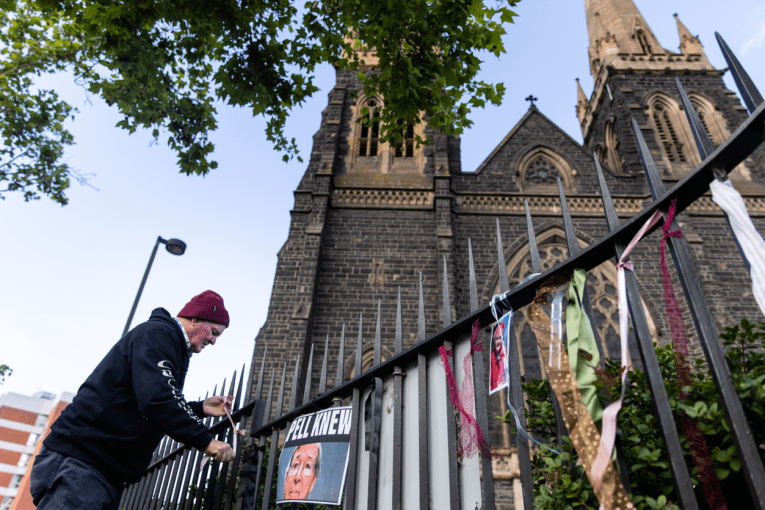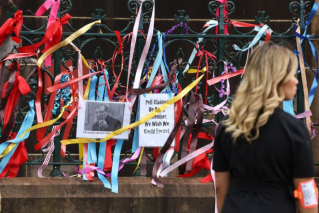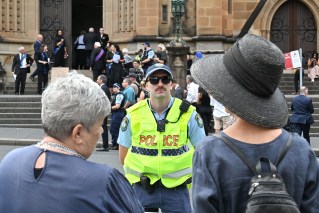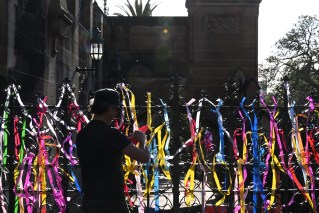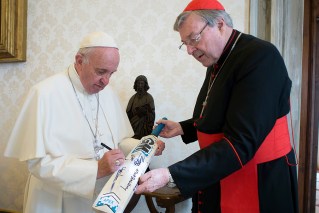George Pell to spend birthday behind bars awaiting appeal decision

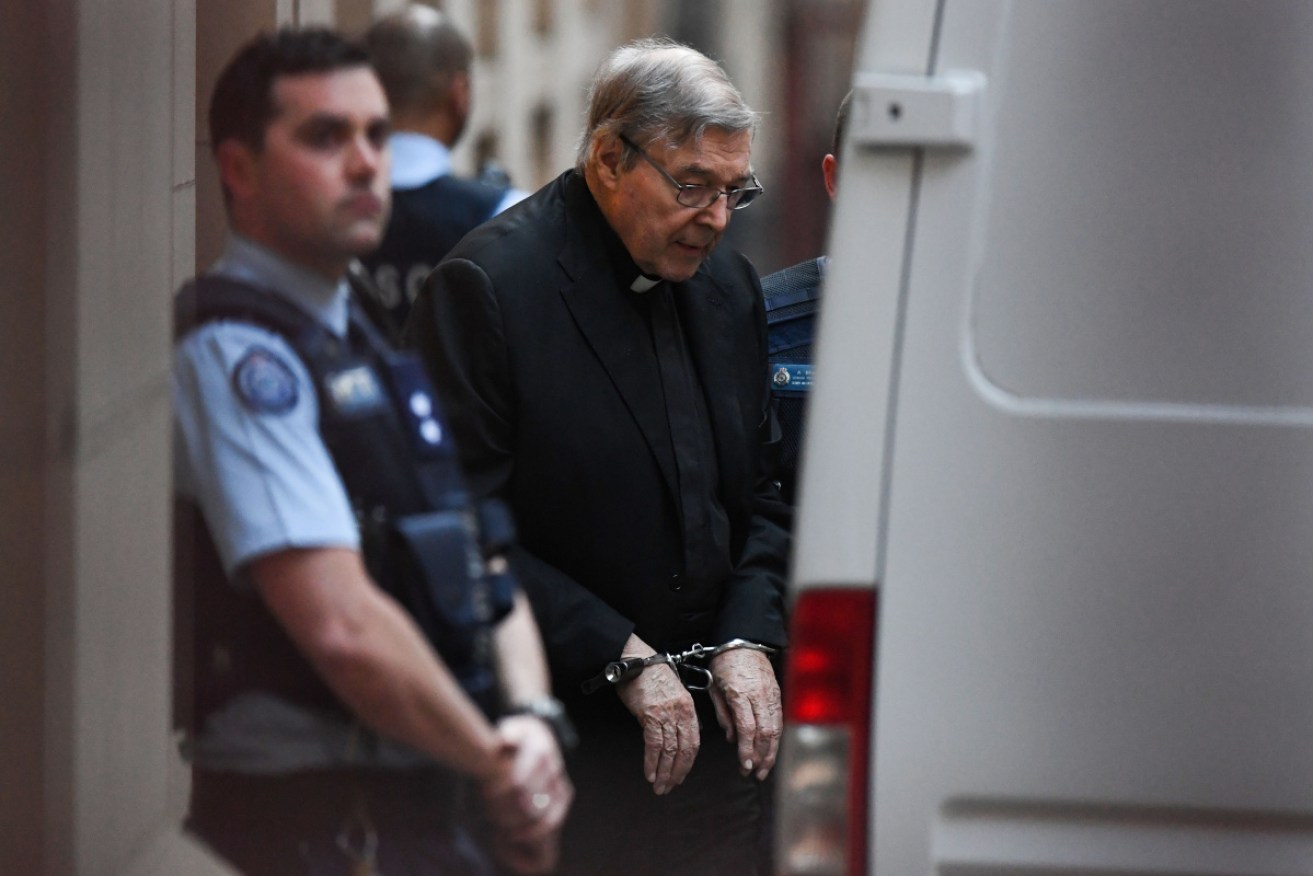
George Pell when he was in custody in Melbourne. Photo: AAP
• Cardinal George Pell was released from prison on April 7, 2020 after the High Court quashed his five convictions for child sexual abuse.
It’s not likely to be the brightest of birthdays for Cardinal George Pell.
The former treasurer to the Vatican will wake up on Saturday morning to the usual sound of a piercing alarm, which signals it’s time to get out of his uncomfortable prison bed and stand for the frequent “jail head count”.
Turning 78 won’t mean this once-decorated clergyman of Rome will get any reprieve from his standard 23 hours stuck in solitary confinement, in a cramped cell in the segregation unit of Melbourne Assessment Prison.
Far from it.
Breakfast, which is usually two pieces of bread with a sealed portion of jam and piece of butter, plus cornflakes and a mini milk carton, will be delivered to his cell.
Perhaps if he’s lucky, his next-door neighbour, Bourke Street killer driver James Gargasoulas, will bid him many happy returns.
He will no doubt open cards from his family, friends and many supporters offering hope and prayers that three appeal judges, based just a few minutes away on the corner of Lonsdale Street and William Street, will deem his shock December conviction unsafe and set him free.
It’s a hope that is keeping him positive and able to cope with the tough regime of prison life, Pell’s friends have told The New Daily.
He has inwardly reframed his time behind bars as a “retreat”.
A retreat because he prays his predicament is temporary.
This week, over two tense and dramatic days in Court 15 of the Supreme Court of Victoria, his expensive new Sydney-based barrister, Bret Walker SC, argued fiercely that the guilty verdict at the end of the re-trial on charges of sexually assaulting two choirboys in his own Melbourne cathedral in the 1990s was a grave error by 12 members of the public.

Pell was seen in court taking notes during day two of his appeal. Photo: AAP
Thirteen obstacles to conviction
Mr Walker, whose written submission argued there were 13 obstacles in the path of a conviction, said the most “obvious feature” of the “unsatisfactory” guilty verdict was the lack of witnesses to the alleged crimes.
The surviving choirboy, he said, was a liar and fantasist.
Regarding the first assault in the sacristy after Sunday mass in 1996, he said the incident could not have taken place in the busy area: “No one else, apart from the victim or the perpetrator, was in that room for five or six minutes.”
Pell, who has always strongly denied committing the crimes, was wearing a black suit and shirt during the two-day hearing.
His white clerical collar, noticeably missing during his sentencing hearing, was back in place.
In court, at least, he looked more cardinal than inmate.
He wrote notes, looked carefully at the judges and occasionally glanced at members of his family, including his equally tall brother David, sitting in the front row.
Several reporters speculated he seemed to be smirking from behind his hand, when on day two the barrister leading the Crown’s fightback to prevent Pell’s freedom, Christopher Boyce SC, appeared to make a somewhat disastrous mess of the whole affair.
Prosecution problems
Within minutes of getting to his feet Mr Boyce was admonished by Chief Justice Anne Ferguson for mentioning the name of the surviving accuser in the case, a Melbourne father in his mid-30s.
Perhaps shaken by the error, the barrister proceeded to stumble, mumble and bumble through the next few hours, stuttering through questions from the judge and causing social media to blow up with accusations he was letting the victim down with his seeming lack of lucid presentation.
Even though his personal style may have differed greatly from Mr Walker, not to mention the theatrical Robert Richter who led the defence team during the trial, the main message of the crown case still got through.

Justice Maxwell, Chief Justice Ferguson and Justice Weinberg are expected to hand down their decision in coming weeks. Photo: Supreme Court of Victoria
The victim, he said, gave evidence that was “compelling” and he should be believed.
He argued the accuser was “taxed on everything under the sun” by Mr Richter, one of the Australia’s leading defence barrister notorious for his forensic and fierce questioning.
“This wasn’t a cross-examination, this was a great cross-examination,” he said.
“And this witness dealt with it willingly and with patience … things he got wrong he would concede.”
Asked by the judges why the choirboy never told anyone about the attacks at the time, Mr Boyce suggested he “just wanted to get on with his life.”
“It’s perfectly, perfectly reasonable for a boy to just want to get on with his life.”
Speaking in the court, also attended by Jesuit priest Frank Brennan and Pell supporter Peter Westmore, the barrister also pointed out that the choirboy had a scholarship to an exclusive Melbourne school that he didn’t want to risk losing and that his parents were divorcing.
“It’s [also] so embarrassing though, so incredibly embarrassing … is that something you want to talk to your friends about?”
Justice Mark Weinberg told the barrister that relying on the the testimony of the accuser wasn’t enough on its own, pointing out that it “needed to be tested”.
“What we are questioning is are we satisfied beyond reasonable doubt by the complainant and what he says is beyond reasonable doubt,” Justice Weinberg said.
During later discussion regarding the second incident, in which the cardinal was charged with pushing the surviving choirboy up against a wall and squeezing his genitals, Justice Chris Maxwell suggested it was “wildly improbable that the archbishop wouldn’t have been seen”.
‘Take the applicant away’
At the end of the hearing, Justice Ferguson declared the judges would “reserve” their judgement and gave no indication of how long.
But it’s believed to be likely to be delivered within the next two weeks.
“Please take the applicant away,” she told the guards, as they led the cardinal out through the pine wooden door at the back of the court.

To the court, Pell is simply an ‘applicant’. Photo: AAP
While it’s not known if the missteps in the crown submission make a difference to Pell’s chances, it should be noted that the three judges have already spent weeks reading transcripts, watching video testimony and even paying a visit to the cathedral.
The appeal hearing was more of a chance to ask questions and dig deeper; it’s not the whole story.
If the judges uphold the appeal, Pell will be released immediately. If they don’t he could take the case to the High Court, and his dogmatic, determined character shows he would.
For now, in the eyes of the law, the cardinal is an appeal applicant.
A prisoner with a lot to gain if he’s freed and a lot of birthdays to lose if he fails.
Anyone affected by this article can contact Lifeline: 13 11 14
Investigative journalist and writer Lucie Morris-Marr has covered the entire Pell case for The New Daily. Her forthcoming book, Fallen – The inside story of the secret trial and conviction of Cardinal George Pell, will be published by Allen & Unwin in September
